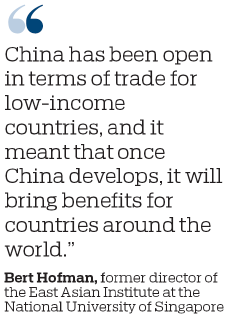
More efforts should be made from emerging economies to drive a more equitable, multilateral global order to navigate rising disruptions such as geopolitical tensions and sanctions from some Western countries, leading economists and industry experts said on Thursday.
They made the comments at a session of the Global Strategic Dialogue 2024: Responsibilities of Major Countries Amid a Dynamic Global Landscape that was jointly held by the Chinese Academy of Social Sciences and China Daily on Thursday.
Fedor Voytolovskiy, director of the Institute of World Economy and International Relations of the Russian Academy of Sciences, said, "Globalization will be more and more deformed by the practices of economic warfare and attempts to weaponize interdependence. Attempts of the United States and European Union to use economic and technological interdependence as a weapon will be continued."
The US will try to continue these practices, Voytolovskiy said, adding that they will have "very negative" effects for the whole global economy.
He said, the world is heading toward a poly-centric system, where a balance of power is essential to global stability. However, he was skeptical of the likelihood that such a balance could be achieved in the next five to 10 years, warning that continued efforts by the US to maintain its dominance could further destabilize the global economy.
The shifting economic dynamic was echoed by Yu Yongding, an academic member of the Chinese Academy of Social Sciences, who said that the US is weaponizing the international financial system — for instance, freezing $300 billion worth of Russian Central Bank reserves.
"Who can still be confident that the US will not freeze the foreign exchange reserves of other countries in the future?" he asked, raising concerns that the weaponization of finance could lead to the fragmentation of the global monetary system.
Yu said, "The trade war has led to decoupling and reshaping of global production chains against the principle of comparative advantage, a situation that will ultimately harm all countries involved… It is not to the benefit of anybody to achieve a Pyrrhic victory in a trade war."
He noted that despite geopolitical tensions, China cannot afford to fully disengage from global supply chains.
"The same applies to the West, which suffers risks from decoupling from China," he said. "However, China will continue to support multilateral institutions, urge countries to eliminate the influence of geopolitical tensions and work toward restarting regional financial cooperation."
China's stance was also echoed by Ukeru Magosaki, director of the East Asian Community Institute and a former professor at Japan's National Defense Academy, saying that China's economic rise has surpassed that of the US in terms of real GDP measured by purchasing power parity.
He also noted the growing influence of non-G7 economies such as India, Russia, Brazil and Turkiye, whose combined GDP now eclipses that of the G7 economies.
"The more time passes, the bigger the gap of economic power moves in favor of China," Magosaki said. He said he expected non-G7 countries to increasingly assert their influence on the global stage, provided they adopt China's principles of peace.
He said the future of economic development depends largely on the research and development of each country, noting that China surpassed the US in the number of top 10 natural science research papers published in 2020 and 2022.
"This shows the likelihood of China's potential development in the future," Magosaki said.
Citing China's Belt and Road Initiative, Bert Hofman, senior fellow and former director of the East Asian Institute at the National University of Singapore, said the project was a good example of how a major power should behave.
"China has been open in terms of trade for low-income countries, and it means that once China develops, it will bring benefits for countries around the world," he said.
To navigate the current global landscape, Mwangi Wachira, a former World Bank economist and adviser to the Kenyan government, said that Africa should have more than a token role in the ongoing drive for an equitable multilateral global order.
"To support either the reform of the current global order or the creation of a new truly equitable and multilateral global order, Africa must not allow itself to become a theater for contests between unilateralism and multilateralism," he added.
chengyu@chinadaily.com.cn

